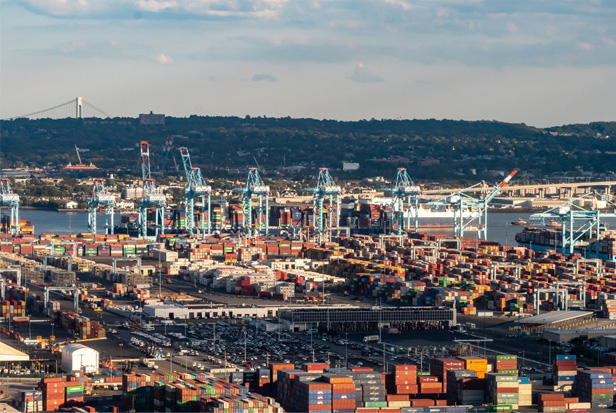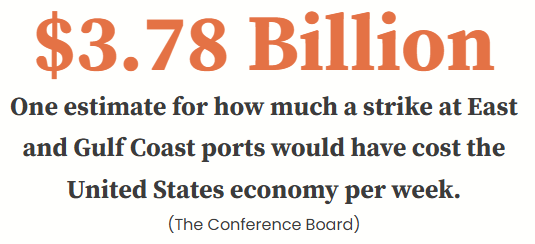Key Takeaways
• Deal Reached: A tentative contract agreement for port workers between ILA and USMX has averted a port strike, allowing for continued operations.
• Upsides: Proponents said the agreement promotes job protection, port modernization and technology adoption while preventing strike-driven disruption to the supply chains of promo and other industries.
• Key Compromise: The deal reportedly includes compromises on automation that, sources said, aim to secure jobs while modernizing port operations.
A supply chain crisis stemming from a feared port strike appears to have been avoided – and that’s good news for the promotional products industry.
Negotiators for the International Longshoremen’s Association (ILA), a large union, and the United States Maritime Alliance (USMX), representing port employers, have reached a tentative agreement on a new six-year master contract for unionized dockworkers on the East and Gulf Coasts.

Rank and file for the union and members of USMX still need to ratify the new deal. Nonetheless, the tentative agreement, announced late Jan. 8, allows for the port workers to continue working under the current contract until ratification votes occur, thereby negating a potential strike that was planned to begin after Jan. 15. When ratification may happen was unclear.
In a joint statement, ILA and USMX called the agreement a “win-win” that will benefit American consumers and businesses.
“This agreement protects current ILA jobs and establishes a framework for implementing technologies that will create more jobs while modernizing East and Gulf Coast ports – making them safer and more efficient and creating the capacity they need to keep our supply chains strong,” the statement said in part.
Leaders in the promotional products market and other industries praised the tentative deal.
“This is great news for promo. It’s exciting to start 2025 on a positive note,” said Tim Behling, vice president of supply chain at Counselor Top 40 supplier Gemline (asi/56070).
“We are pleased to see the ILA and USMX come to a final agreement on a new contract, as U.S. ports on the East and Gulf coasts play a critical role in the retail supply chain,” the National Retail Federation said in a statement. “Providing certainty with a new contract and avoiding further disruptions is paramount to ensure retail goods arrive in a timely manner for consumers. The agreement will also pave the way for much-needed modernization efforts, which are essential for future growth at these ports and the overall resiliency of our nation’s supply chain.”
Contentious Talks Included an October Strike
ILA members went on a three-day strike in October, but the work stoppage ended after the parties reached a tentative agreement on wages that will reportedly see the workers’ pay raised by 62% over the life of the contract.
Still, other elements of the contract needed to be worked out, including, most controversially, contract language over semi-automation and automation at the ports. Union leadership was reportedly dead-set against automation, calling it a job-killer. USMX had argued some semi-automation is necessary to modernize the ports and, if implemented, would actually help create more union jobs.

Things got so testy over automation that ILA negotiators walked away from talks in November. While informal discussions continued, formal talks didn’t begin again until Jan. 7. Clearly, they were fruitful.
The ILA and USMX weren’t releasing details of the new contract yet. Even so, CNBC reported that sources familiar with the negotiations shared that there were compromises on automation that allowed the deal to get done.
“According to the sources, full automation was off the table but essentially USMX has the ability to implement the technology its members feel would modernize the ports,” CNBC’s Lori Ann LaRocco wrote. “The ILA has the guarantee of specific jobs that would be associated to specific equipment being added.”
By one estimate, a strike would have cost the United States economy $3.78 billion a week and disrupted the supply chains of a spectrum of industries, including food, pharmaceuticals, apparel, automotive and promotional products. The three-day strike in October caused delays and backlogs at affected ports that lasted for weeks.
Promo wasn’t significantly affected by the three-day strike this past autumn. Had a work stoppage stretched into weeks instead of days, however, the consequences could have been more dire, including considerable delays in getting products made overseas landed and stocked stateside while sending importing/shipping costs soaring.
Such ills, if protracted, could have led to stock gaps in promo and higher pricing on products. The vast majority of products sold in the North American promo industry are imported.
Harold J. Daggett, international president of the ILA, credited President-elect Donald Trump’s support for the union as important to the contract resolution. Trump had recently professed support for the ILA, particularly on the issue of automation.
“President Trump’s bold stance helped prevent a second coast-wide strike at ports from Maine to Texas,” Daggett said.



